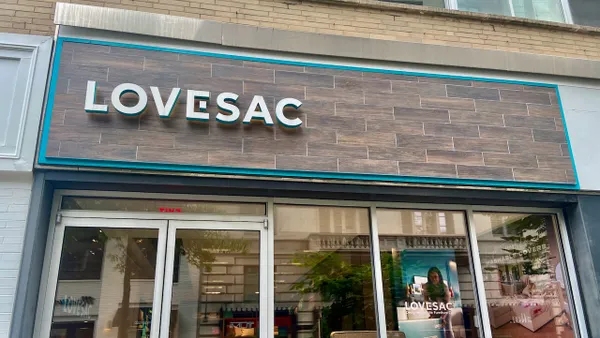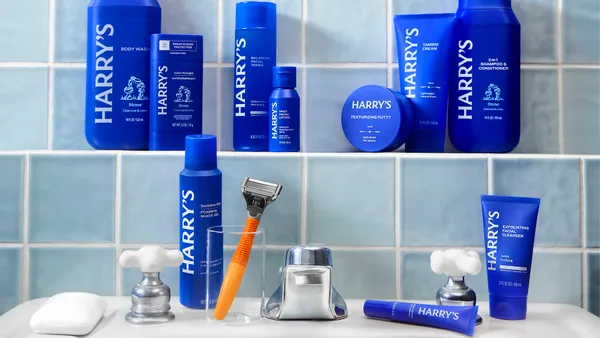Dive Brief:
- Los Angeles Apparel, Dov Charney's latest made-in-the-USA manufacturing effort, has quietly launched retail operations, according to posts from Charney on his Facebook and Instagram accounts and the brand's website. "The site is just at its beginning stage as we opened by way of a soft launch several days ago," Charney told Retail Dive in an email on Monday. "We have done no advertising yet; however, demand and reaction has been super-encouraging and heartfelt."
- Charney launched the brand earlier this year after losing a bruising, years-long battle to hang on to his first venture, American Apparel. The vertical retailer was ultimately bought by Canadian T-shirt and basics maker Gildan this past January for $88 million.
- Los Angeles Apparel has done steady wholesale business since its launch. Its first two days in online retail sales did more volume than the first few months at American Apparel, Charney told Retail Dive. T-shirts, sweatshirts, bodysuits and leggings are for sale now, and Charney says the assortment is expanding "in coming weeks and months" to a denim line for women, a work pant line for men and women, a canvas bag line and swimwear.
Dive Insight:
News of Charney's move into retail sales comes as American Apparel's new owner is under fire for breaking its promise to maintain the brand's commitment to ethical garment manufacture, according to interviews with some of the Honduras-based employees by The Guardian newspaper. But many of those descriptions "do not necessarily present an accurate depiction of the situations," Gildan spokesperson Garry Bell told Retail Dive in an email, refuting several details in the article regarding firing of workers and Gildan's status as an employer in the region, with several accolades for its ethical employment.
"At American Apparel we’ve always believed in sweatshop-free and ethical manufacturing," the Gildan-run American Apparel website also reads. "We’ve also always believed that border lines are pointless."
Charney himself has said he agrees with Gildan that ethical production, including a living wage and safe working conditions, is possible overseas. But, in lengthy interviews with Retail Dive earlier this year, he also said that keeping manufacturing in the U.S. makes supervision of quality, both in the workplace and in the production, much easier.
"Everybody's relying on sweatshop labor — and I'm not. I’m not saying I'm an angel, but the entire foundation of my business doesn't rely on 60 cents an hour," he told Retail Dive earlier this year. "I want to make Los Angeles proud. My goal is to disrupt the notion that we can't make great products without relying on cheap labor."
L.A. Apparel is already selling to TSC Apparel, which Charney says is one of the top three T-shirt distributors in the lucrative wholesale business that serves rock-and-roll, corporate and school merchandisers — the very business in which American Apparel began and always thrived. In fact, the upstart company’s premium shirts have for months been competing against Gildan’s American Apparel goods in wholesale; now they're competing on the retail side too. The robust sales indicated by Charney suggest the potential of e-commerce to jump-start his fledgling new brand, a channel unavailable to American Apparel in its early days.
Charney has denied the sexual harassment accusations that were ultimately American Apparel's board's reason for firing him. Even so, his reputation — bolstered by his own admissions about questionable behavior as well as his tawdry marketing approach — could hurt his new venture at this stark cultural moment. With sexual harassment and assault accusations breaking into the news and marring or ending careers at a rapid pace, Charney and his new brand will likely have to tread carefully.
That could include the new company's approach to marketing. The highly sexualized approach to ads that Charney brought to American Apparel might draw controversy now, especially given the cultural moment and the allegations around Charney. In conversations earlier this year with Retail Dive, Charney wouldn't say much about the marketing approach for Los Angeles Apparel, except to say that it will broadly resemble American Apparel’s.
"I'm not saying that it will have the same high temperature, but it will be authentic," he said. "The workers are part of it, the culture of Los Angeles is part of it. But human sexuality is part of the reason that people wear clothes. You’re not going to escape our sexuality from a narrative about a clothing company."














